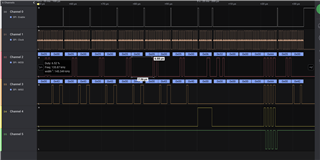Look like a hard coded bug in API generated in build\zephyr\include\generated\syscalls\flash.h ?
-- Found BOARD.dts: zephyr/boards/arm/nrf52840dk_nrf52840/nrf52840dk_nrf52840.dts.
When the QSPI interface of nRF52840 is set to quad mode, there is a quad enable(QE) bit of the status register of the external QSPI flash is also needed to be set. The QSPI flash used in the nRF52840_DK is MX25R64 from Macroni and the QE bit is bit 6 of the status registeras indicated in page 26, table 3 of the MX25R64
https://www.mxic.com.tw/Lists/Datasheet/Attachments/7873/MX25U25645G,%201.8V,%20256Mb,%20v1.4.pdf
0x40 is seemed to be hard coded in the API generated in build\zephyr\include\generated\syscalls\flash.h when the QSPI is in Quad mode. It works fine if you are using the nRF52840_DK, but it may break when you have a custom board with a different flash chip. I am using GD25LQ80C and the QE bit is bit 9 instead of bit 6 and bit 6 is for block protection, so using the API generated will fail in write operation if QSPI is in quad mode because the chip is block protected.
Page 11 of the following data sheet from gigadevice. bit 9 is the QE bit and bit 6 is for block protection.
There is nothing in the zephyr.dts generated can mislead to a MX25R64 being used
-- Generated zephyr.dts: build/zephyr/zephyr.dts
qspi: qspi@40029000 {
compatible = "nordic,nrf-qspi";
#address-cells = < 0x1 >;
#size-cells = < 0x0 >;
reg = < 0x40029000 0x1000 >;
interrupts = < 0x29 0x1 >;
status = "okay";
label = "QSPI";
sck-pin = < 0x13 >;
io-pins = < 0x15 >, < 0x17 >, < 0x20 >, < 0x16 >;
csn-pins = < 0x21 >;
gd25lq80c: gd25lq80ceigr@0 {
compatible = "nordic,qspi-nor";
reg = < 0x0 >;
writeoc = "pp4o";
readoc = "read4io";
sck-frequency = < 0x1e8480 >;
label = "GD25LQ80C";
jedec-id = [ C8 60 14 ];
sfdp-bfp;
size = < 0x800000 >;
has-dpd;
t-enter-dpd = < 0x64 >;
t-exit-dpd = < 0x64 >;
};
};
The following is the waveform captured from the logic analyzer indicating bit 6 of the external flash is being set by the API generated.0x05 is the Read Status Register command(RDRS) and the result is 0x43. bits 0 and 1 are WEL and WIP. However, bit 6 is Block protection bit for GD25LQ80C and QE bit for MX25R64. <--- See the problem!!!

0x05 is the RDSR Read Status command and the 0x43 is the result indicating the bit6(BP for GD25LQ80C but QE for MX25R64). bits 0 and 1 are WEL and WIP for write enable latched and write in progress. Repeating 0x05 Read Status commands pulling 0x43 until it became 0x40 when both WIP and WEL were cleared to 0 indicating the write operation was done. However, 0x40 indicating bit 6 was set. It is a problem for GD25LQ80C when block protection is set in a write operation, but it is the QE bit for the MX25R64.
Since block protection bit 6 of the status register was set(0x40). The write enable command(0x06) and program page command(0x32) failed to write data into the GD25LQ80C flash device.
0x40(bit 6) is cleared when the QSPI interface is set to standard mode.
My set up
-- Zephyr version: 2.4.99
NCS Toolchain 1.6.1 for building.
-- The C compiler identification is GNU 9.2.1
-- The CXX compiler identification is GNU 9.2.1
-- The ASM compiler identification is GNU
I am using a MAC
MAC OS. Big Sur. ver 11.5.2
Model Name: MacBook Pro
Model Identifier: MacBookPro14,1
Processor Name: Dual-Core Intel Core i5
Processor Speed: 2.3 GHz
Number of Processors: 1
Total Number of Cores: 2
L2 Cache (per Core): 256 KB
L3 Cache: 4 MB
Hyper-Threading Technology: Enabled
Memory: 8 GB
System Firmware Version: 429.140.8.0.0


